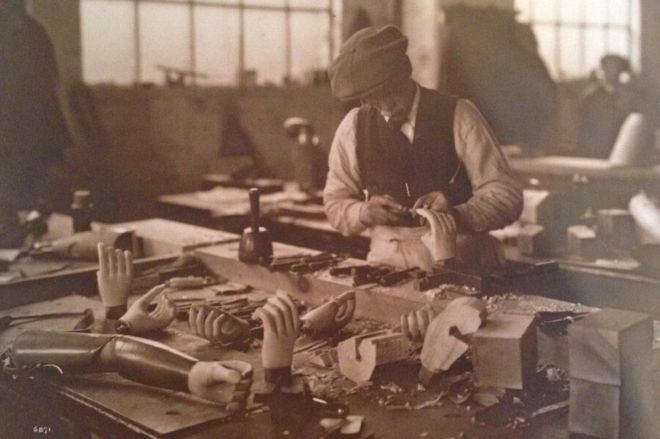|
|
Post by UKarchaeology on Nov 24, 2015 1:25:05 GMT
 Historical documents and artefacts from an old hospital, some of which were found underneath floorboards, are to be formally catalogued. Historical documents and artefacts from an old hospital, some of which were found underneath floorboards, are to be formally catalogued.Some of the archive, charting the 100-year-history of the Erskine Hospital, was recently found in a locked room in a disused part of the hospital. The hospital was formerly known as the Princess Louise Scottish Hospital for Sailors and Soldiers. Woodworking tools used to make prosthetic limbs are among the archive. The tools were used by some of the recovering soldiers as part of their rehabilitation and training in new skills. They made a wide range of wooden medical appliances for disabled soldiers, including the then pioneering Erskine Leg - a prosthetic limb designed and pioneered by Sir William Macewen, co-founder of the hospital and Regius Professor of Surgery at the University of Glasgow. Full story: www.bbc.co.uk/news/uk-scotland-glasgow-west-34899609 |
|
|
|
Post by UKarchaeology on Nov 24, 2015 1:33:07 GMT
Another article on the matter; Moving memories of Erskine's World War One patients A forgotten collection of historical documents and artefacts telling the story of wounded soldiers in the First World War has been uncovered in a locked room and under floorboards at Erskine Hospital. The extraordinary archive was discovered by staff researching the history of the hospital in Renfrewshire ahead of its centenary next year. The collection includes lost records of soldiers, some in their teens, who were sent to the hospital after losing limbs in the Great War. There are also woodworking tools used by some of the recovering soldiers as part of their rehabilitation and a wide range of medical appliances, including a prosthetic limb designed and pioneered by Sir William Mcewan, co-founder of the hospital. The archive will now be collated and preserved by Erskine, which cares for veterans of the armed forces, and The University of Glasgow's Archive Services led by the historian and television presenter Dr Tony Pollard. Speaking at Glasgow University's archives in Thurso Street, where the collection is being preserved, Dr Pollard said he hoped the rediscovered archive would help shed new light on the medical developments during the Great War as well as raise the profile of Sir William and his pioneering therapeutic work with injured soldiers. Full story/pics: www.eveningtimes.co.uk/news/14096108.display/ |
|